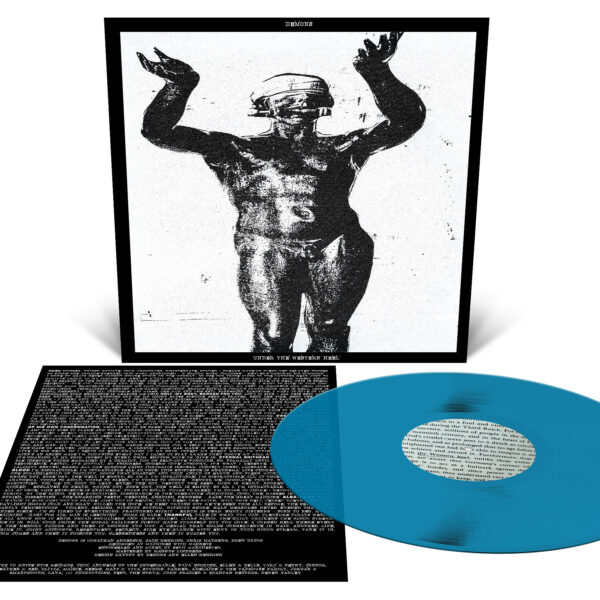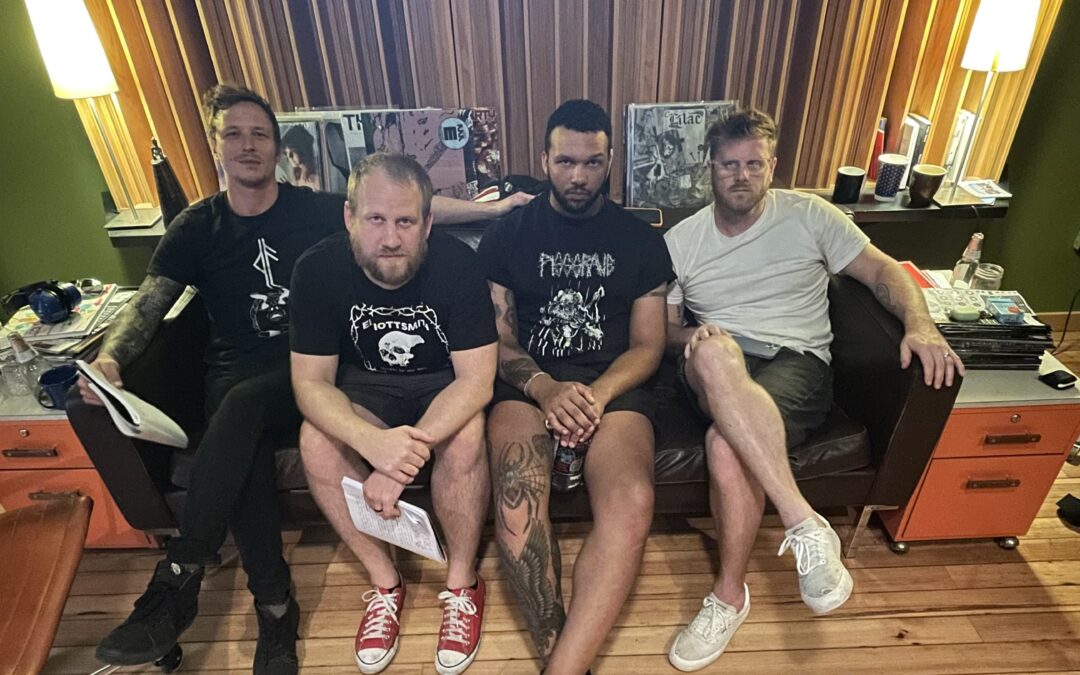By Jeff Maisey
Norfolk hard-edge punk rock band Demons will unleash its new full-length album, “Under the Western Heel,” with a big stage performance August 12 at The NorVa.
Previously, the quartet, comprised of Zach Gehring (vocals/guitar), Chris Matthews (guitar/vocals), Jonathan Anderson (bass), Drew Orton (drums), have released three EPs — “Great Dismal” (2015), “Made in the USA” (2018) and “Swallow” (2022) — as well as the long-play studio records “Embrace the Wolf” (2017) and “Privation” (2021).
The NorVa album release party — get the blue vinyl — will also serve as a showcase of local underground music with electronica-focused Karacell both opening and closing the evening, and Rose Milk, Wandcarver, and Community Witch also of the bill.
I recently caught up with Gehring for some insights into the new album.
VEER: Is there a message behind the album title “Under the Western Heel” or is it up to the listener to determine? A weakness (as in Achilles) in or living in Western Civilization 2023?
Zach Gehring: More-so the latter. It’s taken from James Baldwin’s “The Fire Next Time.” We decided upon it here as a response to this panicked hysteria triggered by the perceived “decline of Western values” heralded by fascist talking heads and cautious (neo)liberalism. It underscores the lyrical frames of these songs, which are, implicitly and explicitly, a response to the grotesque and decrepit meanderings of our current moment.
VEER: A lot of bands release tracks/singles in advance of an album. Is there an advantage in doing so?
Zach Gehring: At a very basic level, I think the advantage is simply raising awareness of the coming album. In the pre-streaming era, releasing advance singles was part of the promotional strategy to make the first week’s sales as high as possible. Today, raising awareness of the coming album is, of course, still important, but the strategies and metrics have changed. I personally still don’t have a solid grasp on how those strategies are developed for streaming platforms within digital economies, and at the moment, Demons operates below that realm. Knife Hits Records and The Ghost Is Clear Records, both very cool and very small independent labels we worked with to put this album out, simply want to get the record in front of as people as possible.
VEER: “Sweet Dreams” is one of two released in advance thus far. In a recent interview with Decibel, Zach, you’re quoted as saying, “Lyrically, ‘Sweet Dreams’ is a rationalization of the decision to play along in something that I know won’t end well.” Can you expand upon this and share what is is that won’t go well?
Zach Gehring: There’s nothing specifically autobiographic that I’m discussing here. I’m talking about the very limited horizon and situational awareness that infects ambitions or goals, be they relational, professional, creative, etc. The foregone conclusion of failure is not merely a specific result of our own decisions but also a recognition that what we’re engaging in is conditioned to fail by design. We’re infected with guilt because we still have this stubborn attachment to the rhetoric of the “American dream” and individual responsibility that we, nonetheless, simultaneously understand to be an ideological fantasy; a guilt that still translates systemic inadequacy as personal failure. The complexity and contradictory flows of thought and emotion are exhausting, and when we can’t explain ourselves clearly, or understand ourselves – it manifests in weird ways. I’m interested in what motivates us to do the things we do.

VEER: Lyrically, are the songs on the album more focused on personal experiences, social issues, or political commentary?
Zach Gehring: My initial response is that our songs fall more in the personal sphere. But, I also think that our personal experiences are connected and stem from social and political issues, so it complicates the distinctions you draw here. Songs that are personal (e.g. “Thankful,” the last track on the album) are ultimately, to a degree, socio-political. That being said, you can definitely see a stylistic and topical distinction between the words I write vs those Chris writes. Perhaps they are just individually existential?
VEER: When composing an album’s worth of tunes, do the lyrics come first or the music? What is Demons’ songwriting process?
Zach Gehring: It mostly starts with a musical idea, and the song is developed with little consideration of words. We are not a melodic band. The question of lyrics mostly revolves around a rhythmic dimension, i.e. how can we deliver the words we write within this particular time signature or riff? Some songs come fast, some come slow. Our last EP called “Swallow” was a COVID project where we decided to write only minute-long songs. We recorded four songs and it takes about 4.5 minutes to listen to the EP. At this point, we’re definitely starting to see how our personal creative styles are diverging and converging, and it’s making things more interesting – at least in terms of writing the songs.
VEER: Musically, “Husk” and “Sweet Dreams” have a chaotic blend of heaviness bordering both hardcore punk and non-Cookie Monster metal. What emotions do Demons hope to both express and elicit in its approach to heavy instrumentation and raging vocal “melody”?
Zach Gehring: The first word that comes to mind is desperation. So much of what we are doing lyrically is a reaction to our own experiences within a shared reality we, like everyone else, are forced to navigate. For us, this manifests in noise.
VEER: Do chaotic times — wars, pandemics, social upheavals, environmental danger zones etc — require equally harsh art — whether music or paintings — to reflect the urgency and pain of humanity?
Zach Gehring: I think harsh art always has a place at all times. Equally, I think art that expresses other sentiments is equally important at all times. I think art is a way of dealing with our experiences. I don’t like to deify art, nor do I presume art is inherently sacred. Art is one tactic among many, one that is especially vulnerable to instrumental exploitation because of the ideology (e.g., art as “transcendent”) that informs how we understand and consume it. Art is social and historical.
For us, the ideology of Demons is not a totality. We relish and take seriously the joy and the love in our lives. I’m not entirely sure how to understand and withstand the eternal presence of and felt impact of injustice; often we’re not sure how to respond and negotiate it. But we don’t dismiss or attempt to evict our viscerally angry reactions either; rather, we explore them and responsibly nurture them. They are important and a healthy response to injustice, even if, at first, we don’t have a full understanding of those reactions and what triggers them.
VEER: Your album release show is at The NorVa. What do you like about performing at the venue?
Zach Gehring: Everything – the crew, the stage, the sound, the built-in amenities. The only daunting thing about The NorVa for a band like Demons is its size. So, we do hope that everyone who wants to attend will! We can’t wait. I’ve been seeing shows at The NorVa for the last 15-20 years of my life — a memory that’s never lost on me when I get to play there.




